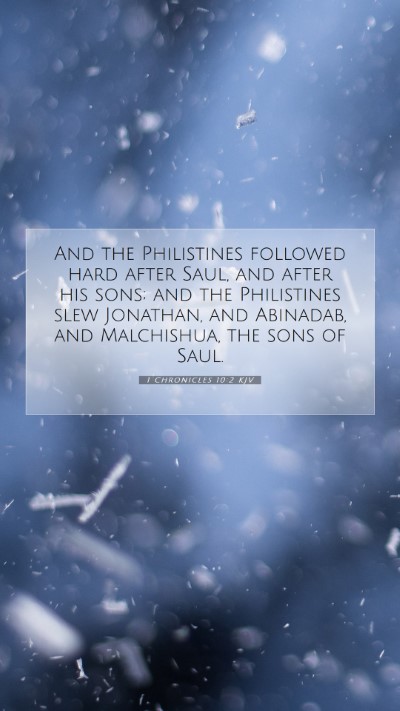Understanding 1 Chronicles 10:2: A Comprehensive Commentary
The Bible verse in focus is 1 Chronicles 10:2, which states:
"And the Philistines followed hard after Saul and after his sons; and the Philistines slew Jonathan, and Abinadab, and Malchishua, the sons of Saul."
This verse depicts a critical moment in Israel's history, marking the battle between the Israelites and the Philistines and providing insight into the tragic fate that befell King Saul's family. Below, we will explore the Bible verse meanings, Bible verse interpretations, and Bible verse explanations based on insights from well-respected public domain commentaries.
Contextual Background
To fully grasp the meaning and significance of this verse, one must understand its historical context. Scholars note that the battle described here occurred during a fierce conflict wherein the Philistines, a formidable enemy, attacked Israel. This battle was not merely a military engagement but a pivotal moment that reflected Israel's spiritual state and reliance on God.
Insights from Commentaries
-
Matthew Henry's Commentary:
Henry emphasizes the tragic loss of Saul’s sons, particularly Jonathan, who was a beloved figure known for his loyalty to David. This loss signifies not only a familial tragedy but also a significant decline in Saul's lineage and Israel's hopes.
-
Albert Barnes' Notes:
Barnes points out that the Philistines' pursuit of Saul reflects the relentless nature of their enmity towards Israel. Their victory over Jonathan and the other sons of Saul indicates the magnitude of the defeat and serves as a crucial turning point for the nation of Israel.
-
Adam Clarke's Commentary:
Clarke provides a detailed analysis of the names mentioned, highlighting the roles of Jonathan, Abinadab, and Malchishua. He elaborates on Jonathan's valor and loyalty, contrasting it with Saul's decline, thus elevating Jonathan's tragic end within the narrative.
Theological Implications
This verse opens up profound Bible study insights regarding the interplay between faith and warfare. The defeat of Saul and his sons can be interpreted as a result of turning away from God, as indicated in previous chapters leading to this battle.
The commentary draws attention to significant themes that are relevant to Bible study groups and Bible study lessons:
-
Consequences of Disobedience:
The downfall of Saul’s family underscores God's judgment against disobedience and reflects the importance of adhering to divine commandments.
-
The Nature of Leadership:
Through Saul’s poor decisions and their repercussions, readers are encouraged to consider the qualities of godly leadership.
Application to Daily Life
Understanding Scripture requires more than just analysis; it involves applying the lessons to our lives. The tragic events of 1 Chronicles 10:2 prompt readers to reflect on their own leadership roles within their families, communities, and spiritual lives.
Using this verse in your online Bible study could encourage discussions on the importance of spiritual integrity and the weight of one's decisions. As you explore this verse in Bible study materials, consider how Saul’s fate serves as a warning to remain vigilant and faithful.
Related Scripture References
Several cross-references enhance the understanding of 1 Chronicles 10:2:
- 1 Samuel 31:1-6 - Details Saul's death and the overall context of the battle with the Philistines.
- 2 Samuel 1:17-27 - David's lament for Saul and Jonathan illustrates the deep emotional impact of their deaths.
- Psalms 78:67-68 - A reflection upon God's choice of leaders as seen in the rejection of Saul's lineage.
Conclusion
In conclusion, 1 Chronicles 10:2 serves as a poignant reminder of the consequences of straying from God's path and the immense weight of leadership. The insights drawn from Matthew Henry, Albert Barnes, and Adam Clarke offer a rich tapestry of interpretation, emphasizing Biblical exegesis and encouraging a deeper understanding of Scripture analysis.


